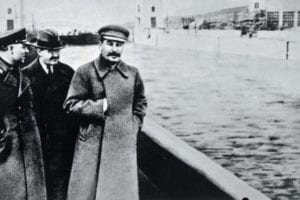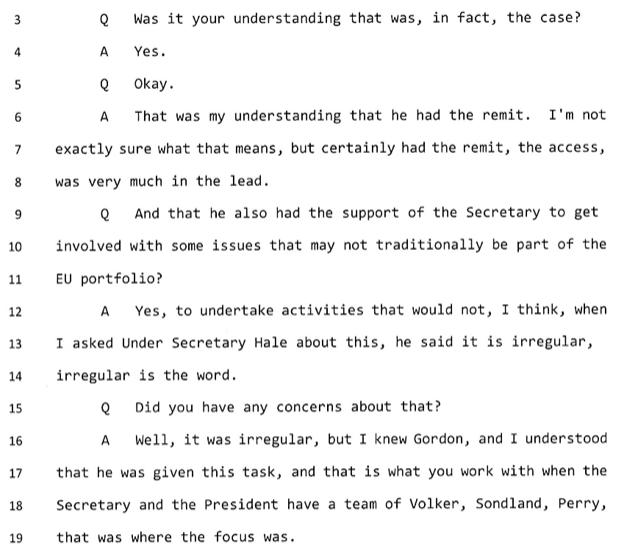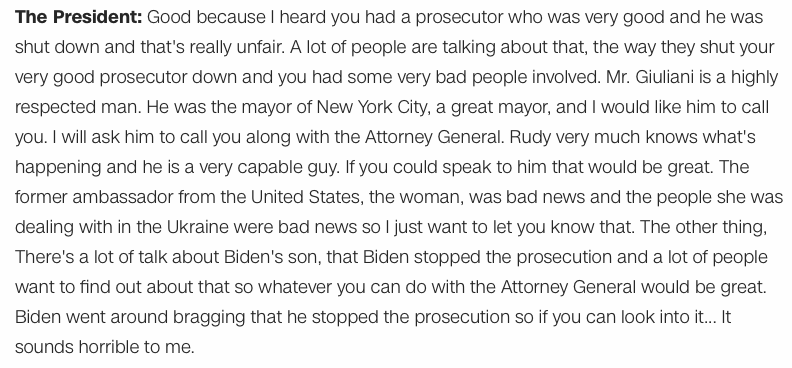When Republican officials adopt the president’s lies, they get reported as almost as credible as whatever the media or the Democrats are saying.
Long before Photoshop was invented, the Soviets figured out how to alter photographs and thereby alter history. In the following example, you can see Nikolai Yezhov, the feared chief of the secret police during the worst of the Great Purge, whitewashed out of a photograph of Stalin. Yezhov was executed in 1940 after having served his purpose. He reportedly insisted on his loyalty to Stalin until the end, even declaring that he would die with Stalin’s name on his lips.


It wasn’t enough to simply kill Yezhov, however. Stalin wanted to eliminate him, as much as possible, from the historical record. That wasn’t an easy task for someone who was responsible for hundreds of thousands of deaths, and cropping him out of a photo seems so insufficient to the task as to be somewhat ridiculous. Still, it was Stalin’s version of, “I hardly knew the guy.”
As of October 9, 2019, the Washington Post had tallied 13,435 false or misleading claims by President Trump since he was inaugurated in January 2017. Among these are numerous denials that he said or did things that are well-documented. Among these are statements that he hardly knew people who worked closely with him or that minimized the amount or importance of their work. There are lies about Russia did in 2016 and lies about what Ukraine did not do in 2016.
One recent example of the former involves the U.S Ambassador to the European Union, Gordon Sondland. On October 4, Trump minimized the statements of the State Department officials who were lining up to give depositions to Congress about Ukraine, “I don’t even know most of these ambassadors. I didn’t even know their names.” But Trump expected Sondland to have his back and called him “highly respected.”
He followed that up with a tweet on October 8, in which he wrote that Sondland “a really good man and great American.” Exactly a month later, on November 8, Trump stood on the South Lawn of the White House and said with a straight face, “Let me just tell you: I hardly know the gentleman.” On November 20, as Sondland was testifying on national television that Trump had engaged in a quid pro quo, Trump told reporters “I don’t know him very well. I have not spoken to him much. This is not a man I know well. He seems like a nice guy though.”
The truth is much different. Sondland had as many as twenty one-on-one phone calls with the president and was widely understood within the State Department to have direct and unusual access to both the president and his chief of staff Mick Mulvaney. In fact, he was effectively given the lead role on Ukraine in a May 23 meeting in the Oval Office, despite Ukraine not being a member of the European Union or an official part of Sondland’s portfolio. To demonstrate my point, the following is from acting assistant secretary of European and Eurasian Affairs Philip Reeker’s October 26, 2019 deposition before the House Intelligence Committee (see, e.g., pages 71-75 for his discussion of Sondland’s role). Reeker had just been asked if it is true that Sondland had been given “a rather large remit (for Ukraine) by the president”?

The latest example of Trump trying to whitewash history came on Tuesday night when he claimed in an interview with Bill O’Reilly that he had not deputized Rudy Giuliani to help carry out his Ukraine policy.
Asked point-blank if Giuliani was acting on his behalf in trying to dig up dirt on former Vice President Joe Biden—an issue now at the heart of an impeachment inquiry—Trump said, “No, I didn’t direct him, but he is a warrior, he is a warrior.”
Let’s compare that to what President Trump said on the July 25 call with President Zelensky of Ukraine:

Trump is very clear there that President Zelensky is to take a call from Rudy Giuliani to discuss several issues, including the investigation of Joe and Hunter Biden. In fact, going back to the May 23 meeting in the Oval Office, Ambassadors Kurt Volker and Sondland were instructed to “talk to Rudy” so they could implement Trump’s instructions for Ukraine.
President Trump’s instruction in May to a U.S. delegation that had just returned from Ukraine made clear that his personal attorney Rudolph W. Giuliani was playing the driving role in shaping the president’s view of that country — and that top officials needed to cater to him, according to transcripts of testimony released this week.
“Rudy had some bad issues with Ukraine, and until Rudy was satisfied, the president wasn’t going to change his mind,” European Union Ambassador Gordon Sondland said in his testimony to House investigators.
After the May 23 Oval Office meeting, Kurt Volker, then-special envoy to Ukraine, contacted Giuliani, attempting to court his support for U.S. foreign policy goals, and also put him in touch with a top Ukrainian official.
There is every indication that Giuliani may soon be indicted on a laundry list of crimes, and so now the president is finally realizing that he needs to create at least a little distance from him. Before long, he may try to tell us that he hardly knew Giuliani and rarely spoke to him. He can do this because he he has two things going for him. The first is a right-wing media Wurlitzer that plays his tune with little contradiction. The second is a mainstream media that does an excellent job of documenting his lies but feels compelled to offer “both sides” of every argument. When the Republican Party and high-ranking Republican officials adopt the president’s line, it gets reported as almost as credible as whatever the media or the Democrats are saying.
This is why you need organizations like the Washington Monthly that do not engage in both-siderism. At Political Animal we call bullshit on bullshit and we document the atrocities without feeling the need to get a quote from partisan hacks like Mitch McConnell, Kevin McCarthy, Lindsey Graham or Devin Nunes. That’s not “balance.” It’s amplifying lies and helping the president act like some modern day Josef Stalin.
As you know, traditional media outlets are cutting staff and going out of business at an alarming rate as the digital revolution continues to steamroll the industry of journalism. We don’t get bankrolled by Jeff Bezos, Michael Bloomberg, or some right-wing oil tycoon. We rely heavily on the support of ordinary readers like you. And if we’re going to survive to tell the true history of what is happening in this country, we need people like you to help us out.
Thanks to a grant from NewsMatch, this is the best time of year to get a subscription to the magazine or to make a simple donation , or both. In fact, if you make a donation right now, —$10, $20, $50, $100, $1,000— your contribution will be matched, dollar for dollar, thanks to a grant from NewsMatch. And if you give $50 or more, we’ll give you a a complimentary one-year subscription to the print edition of the Washington Monthly.
Your contributions to the Washington Monthly are vital, tax-deductible, and much appreciated.















